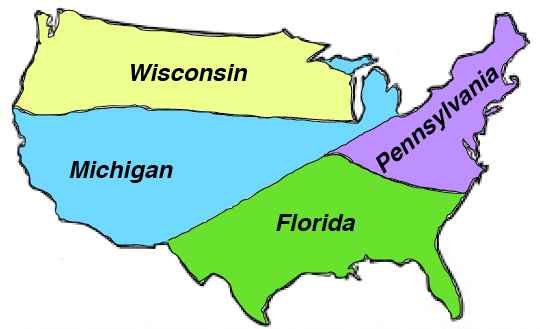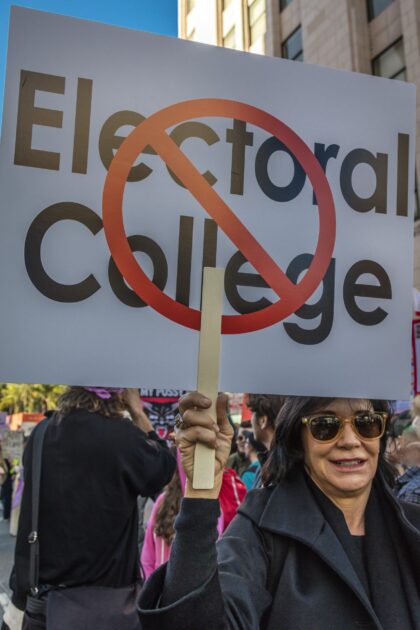A closer look at electoral college reform, the future of democracy, and the college scandal that affects us all

The 2020 election places America at an historic crossroad in our nation’s identity; we must choose between an idealized past and a future born from a culmination of battles fought and won to bring equal measure to men and women today. There is the very real threat to our democratic process as the president has stated he will stay in office as he believes the ballots that American citizens cast in the coming election to be fraudulent. His push to install a new Justice on the Supreme Court who will side with him in a court battle is a coordinated effort with declaring rampant fraud, thus allowing state legislatures in battleground states to discount their ballots and have their electors vote along republican party lines. So, we must re-examine our election process by crunching the numbers, examining the logic, and re-evaluating the goals we set for ourselves through the murky lens of our collective history. What is clear is that we need electoral college reform, or, even possibly its abolition. Because the institution which was set up to protect our democracy could now be used against the will of the people to keep Donald Trump in power.
Numerical representation
The electoral college is disproportionate in its delegate count in relation to the populations they are representing. Wyoming, the country’s least populated state with just 579,000 people, sets the standard for 1 electoral college vote. (It has a total of 3 electoral college votes as all states receive 2 additional votes which represent their senators.) California is the most populous state with 39,800,000 people. It has only 55 electoral votes when it should have 68 electoral votes, (the math is to divide 39,800,000 by 579,000). Those 13 missing electoral votes equal 20% of California’s population. So, states with smaller populations are increasing their voting power over states with larger populations.
Attempts to amend or eliminate the electoral college have been made throughout our nation’s history. The last time a major push to dismantle it was in 1969, when the 91st Congress tried to bring about its abolishment. The leading opponent for direct elections, Carl T. Curtis (R. Neb.), said he did not want “to reduce the voting power of my state by 20 percent.” Curtis’s argument to keep it was that smaller populated states would be hurt by being underrepresented. The irony is the inverse scenario has prevailed.
The census is an integral part of our democratic system as it’s count determines our representation, both in Congress and in the electoral college. This year, the Trump Administration is seeking to stop the census early before it’s completed. Why? States that lean democratic have seen their populations increase while republican states’ population, have by and large remained steady. An inaccurate count is part of the theft of your voting power.

Battleground States
We hear it every four years… 538 is the only number that matters and the only states that matter are battleground states. Also known as swing states, these states can lean both democratic and republican and are crucial to winning the electorate count. It doesn’t matter how close the election is, as Al Gore will attest to after losing the 2000 election by 537 votes in Florida. (He actually only lost by one vote, Justice Scalia’s, who stopped the count and handed the election to George Bush. It was the only time in U.S. history that the vote was halted and the election was decided by a single person.) Suffice to say, these states get more attention from the candidates, more promises are made to appeal to their constituents, and it also undermines the voting power of the masses by appeasing and consolidating the political resources to the few. According to National Popular Vote, an organization seeking to reform the electoral college, only four states will decide this election. The citizens of Wisconsin, Michigan, Pennsylvania, and Florida will determine our collective future and the future of America.
Rogue Rules
Maine and Nebraska use the “District Method” meaning they split their electoral votes between candidates for more accurate representation. Maine has been splitting its electoral votes since 1972, and Nebraska has been splitting since 1996. The other forty-eight states abide by the “winner take all” method that is, in effect, ruining our system of representation. When looking at the map on election night, it appears there are no democrats in Texas and no republicans in California. It’s a false representation of the citizens of this country. The “winner take all” method also undermines the rights of citizens to determine their political leaders. If we are to keep the electoral college in place, we need to reform it to adopt uniform rules for all states and follow the more accurate and democratic “split” to which Maine and Nebraska adhere.
Consider the all tactics that have been implemented to squash or silence an undesirable voting block: gerrymandering, voter purging, voter caging, voter ID laws, voter registration restrictions, removing mailboxes, slowing the post office, and a bevy of mail-in-ballot misinformation. All are manipulations to keep voters from their Constitutional right to hire and fire their representatives. There are too many people in government serving themselves instead of serving their constituency.

Democracy Vs. Republic
There is so much confusion about how we define ourselves, whether we are a democracy or a republic, and which of these political systems informs our government and to what extent. The Heritage Foundation, as well as many other organizations and media outlets would have you believe the United States is a republic. This puzzlement is even present among electors. After the 2016 election, I interviewed two republican electors from Texas. When asked how they view the votes of the people they represent and what they define our system to be, their response was: “Your vote does not matter, only mine does,” and “We do not live in a democracy, we live in a republic.” By definition a republic is a country that has its representative power in its legislature. If the electors do not understand the system they are representing, we have a crisis of ignorance in this country. The fact is the United States is both. We are a democratic republic, or even more technically, a federal constitutional representative democracy.
In simplest terms, our democratic republic gives us the right to vote for our representatives, who use a legislative body to govern, support, and defend the Constitution. All our representatives, from city councilors to senators, are a result of direct elections. Only the office of the president/vice-president is chosen indirectly through that pesky electoral college. And this method has caused more grief than the good it has served. When you take the power from the people and deliver it to a closed group of select citizens, by definition, it’s an oligarchic-republic, not a democratic republic. It’s been argued that the United States is, in fact, an oligarchy, (if Trump has his way it certainly will be). We know the framers of the Constitution did not trust direct elections because they feared a demagogue taking over. (It’s worth looking at the historical context of their decision.) But for all the checks and balances they put into forming our government, our current worst-case scenario is a crisis they did not foresee.
Looking Forward
As we examine our current democratic shortcomings, remember that institutional systemic failure is hardly ever due to one flaw. But rather a culmination of manipulation by policy makers to instigate loopholes to reassert their power. The current rules of the electoral college are not written in the Constitution. And if it’s to our credit that the United States is the oldest democracy in the world, we must understand there is a possibility of it’s failure and the very real chance that we are living in the last days of this grand experiment.
In the next installment on Cultural Weekly, we look at the confluence of history; the slave-owning founders, and the Black Lives Matter movement as it relates to the electoral college and if its reform is even Constitutional.
*This is part one of a two-part series
